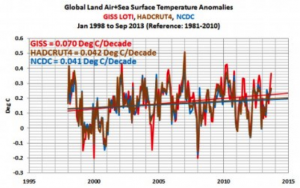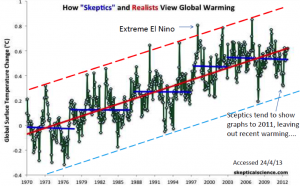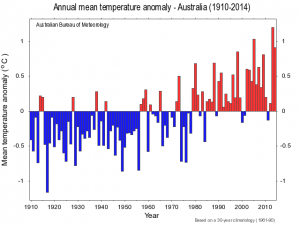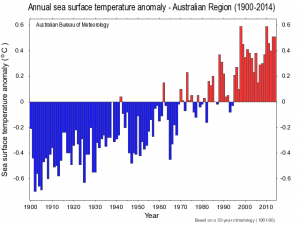Any resemblance to responsible factual reporting is purely coincidental

I am wondering how Andrew Bolt is feeling with the release of a
trio of new studies in two days which confirm how bad the earth’s fever
is.
In November 2013 Bolt wrote an article titled “Fighting the global warming religion”.
He stated that “Atmospheric temperatures have remained flat for at least 15 years.”

The following graph shows the tricks used by deniers like Bolt who pick their data to suit their argument.

Aside from the usual tactics of choosing a very hot year as your
starting point, and using a short time period rather than observing long
term trends, a report from NASA
and the National Oceanic and Atmospheric Administration (NOAA)
confirmed that 2014 was the hottest year ever since reliable records
started being kept in 1880—and the results weren’t even close.

Average global surface temperature worldwide was 14.58º C—surpassing
previous records set in 2005 and 2007—and making 2014 1.1º C hotter than
the average for the entire 20th century. And before you say 1.1º C
doesn’t seem like much, think about whether you’d prefer to run a fever
of 38º or 40º. The planet is every bit as sensitive to small variations
as you are.
Bolt also says “there has been an unexpected pause in warming of
the atmosphere, with the IPCC blaming the deep ocean for hiding the
missing heat where it can’t easily be found. We’ve seen about 0.85
degrees of warming over the past 130 years (which hasn’t seemed to hurt,
I think). That warming slowed dramatically over the past 15 years – to
just 0.05 a decade, or virtually zero.”

According to the journal Science,
marine life forms are growing sicker, with a “major extinction event” a
very real possibility. All through the oceans, the signs of ecosystem
breakdown are evident: the death of coral reefs, the collapse of fish
stocks, the migration of species from waters that have grown too warm
for them to the patches that remain cool enough.
On sea level rises, Bolt says “so far we’ve probably had just
19cms in 110 years. Turns out the median sea level rises tipped under
the four IPCC scenarios for 2100 are between just 26cms and 30cms, with a
very upper limit of 82cms under the most alarming scenario.”
A study in Nature
looked at sea level rise in both the periods from 1901 to 1990 and from
1993 to 2010. It found that sea levels had risen more slowly than
believed in the 90 years that followed 1900, and much faster in the 17
years from 1993 to 2010—close to three times as fast per year from 1.2
(+/- 0.2) mm/year to 3.0 (+/-0.7) mm/year.
Whilst this may not seem like a lot, a single centimetre of water
globally is a lot of water. (in non-metric terms a single inch of water
spread around all of the planet’s oceans and seas represents two
quadrillion gallons of water.) The recent faster rate of rising may
also affect predictions for the future.
Bolt also disputes the warning that a rapidly warming climate could affect the quality and quantity of available food.
“Sheer alarmism. Fact is that extra carbon dioxide means more
plant food, and moderate warming means more rain overall. That, plus
advances in gene technology and agricultural practices, have lead to
record global harvests of food crops.”
That’s the trouble when you get your scientific information from the
Heartland Institute’s favourite ex-TV weatherman, Andrew Watts. Deniers
spend a lot of money to cherrypick data, quote it out of context, and
produce misleading graphics. Whilst production might be higher in gross
tonnage, he ignores demand and yield.
The IPCC
report published last year said that the rate of increase in crop
yields is slowing – especially in wheat – raising doubts as to whether
food production will keep up with the demand of a growing population.
Wheat is the first big staple crop to be affected by climate change,
because it is sensitive to heat and is grown around the world, from
Pakistan to Russia to Canada. Projections suggest that wheat yields
could drop 2% a decade.
The report explored a range of scenarios involving a temperature rise
of two degrees or more that saw dramatic declines in production in the
coming decades. Declines in crop yields will register first in drier and
warmer parts of the world but as temperatures rise two, three or four
degrees, they will affect everyone.
In the more extreme scenarios, heat and water stress could reduce yields by 25% between 2030 and 2049.
The report acknowledged that there were a few isolated areas where a
longer growing season had been good for farming. But it played down the
idea that there may be advantages to climate change as far as food
production is concerned.
Overall, the report said, “Negative impacts of climate change on crop
yields have been more common than positive impacts.” Scientists and
campaigners pointed to the finding as a defining feature of the report.
Other food sources are also under threat. Fish catches in some areas
of the tropics are projected to fall by between 40% and 60%, according
to the report.
The report also connected climate change to rising food prices and
political instability, for instance the riots in Asia and Africa after
food price shocks in 2008.
Bolt’s articles should come with a disclaimer: “Any resemblance to responsible factual reporting is purely coincidental.”




No comments:
Post a Comment